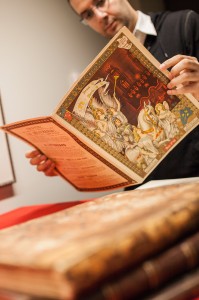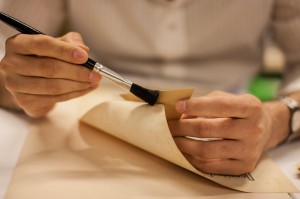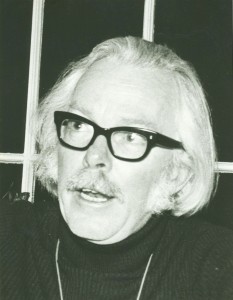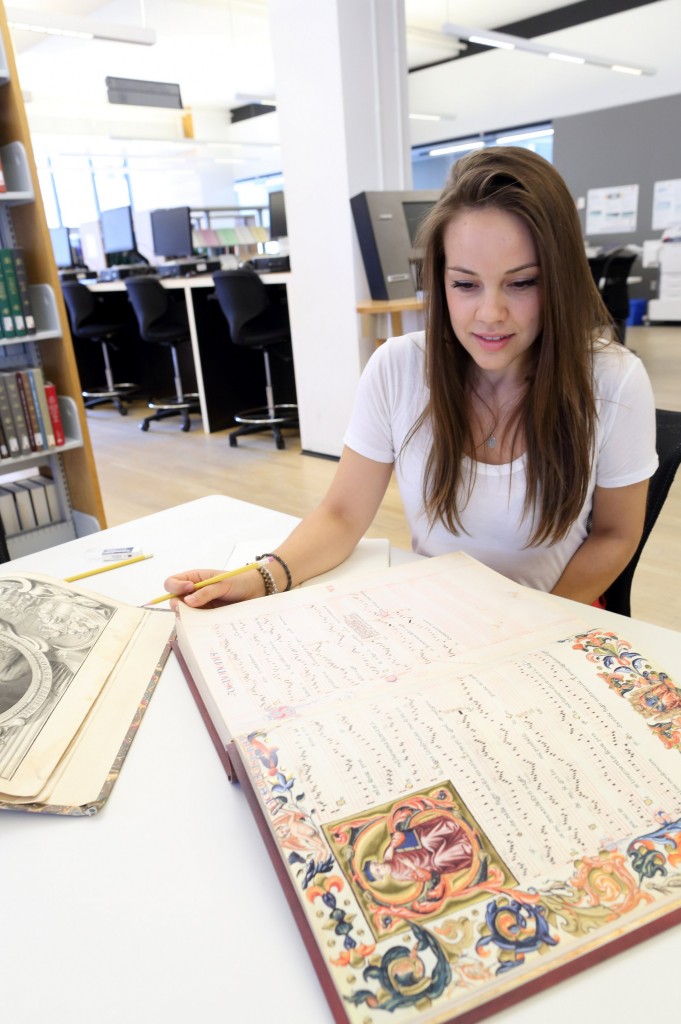 Hello! My name is Houman Behzadi and I am very excited to share one of my recent projects at the Marvin Duchow Music Library with you. During the previous academic year, you might have seen me working at the fourth floor audio/visual reserves or the third floor reference desk. I am afraid, however, that I will be less visible for the next few months as I’ll be spending most of my time “behind the scenes” working in our Rare Book and Special Collections Room.
Hello! My name is Houman Behzadi and I am very excited to share one of my recent projects at the Marvin Duchow Music Library with you. During the previous academic year, you might have seen me working at the fourth floor audio/visual reserves or the third floor reference desk. I am afraid, however, that I will be less visible for the next few months as I’ll be spending most of my time “behind the scenes” working in our Rare Book and Special Collections Room.
Please allow me to tell you a little bit about my background: I hold a Master’s degree in Violin Solo Performance and Literature from the University of Western Ontario and will soon start my second year of a Masters of Library and Information Studies (MLIS) at McGill. My work and study have been in the areas of violin and vocal performance and pedagogy, historical performance practice, music printing and publishing, rare and antiquarian books and scores, and most recently physical conservation and digital preservation. In addition to being employed at the Music Library, I work at the McGill’s Rare Books and Special Collections (http://www.mcgill.ca/library/library-using/branches/rarebooks/) where I have the good fortune of being able to work with rare and antiquarian books and documents.
About a year ago, my supervisor at the Music Library introduced me to a large collection of 19th century French sheet music donated to us by the National Gallery (http://www.gallery.ca/en/) and Library Archives Canada (http://www.collectionscanada.gc.ca/index-e.html/). Two things about this collection caught my attention immediately: first, the richness and beauty of the lithography, and second, the inappropriate conditions in which it had been originally stored. To be more precise, every piece of sheet music had been glued, from its four corners, to highly acidic cardboard. If sheet music publication dates falls around the end of the 19th or the beginning of 20th century, it is likely the attached cardboard will contribute to the discoloration and brittleness of the sheet music. A major step towards the preservation of this fine collection would be to detach each item from its acidic backing (without causing any damage to the item), store it in an acid-free folder and then, along with other sheet music pieces, house it in an acid-free box.
Anticipating some involvement in both the aforementioned project and various other tasks in our Rare Book and Special Collections Room, I felt the need to further educate myself and learn about best practices in the field. Earlier this year, I received an email message through the listserv of the Music Library Association (http://musiclibraryassoc.org/default.aspx) regarding the possibility of attending a Music Preservation Workshop at the Sibley Music Library in Rochester, New York. The Sibley Music Library (http://www.esm.rochester.edu/sibley/) is the largest academic music library in the United States and happens to have its own preservation/conservation laboratory directed by Alice Carli. I managed to take a week off from work to travel to Rochester and attend the workshop. Working under Alice’s direction proved to be an invaluable experience!
Six students in total took part. This meant we got a great deal of personal attention from the instructor. The major areas addressed were:
- Sibley Music Library’s workflow (including the digitization process and their online depository: https://urresearch.rochester.edu/home.action)
- Photocopying and scanning brittle and problematic books or scores
- Discussing various formats and appropriate preservation structures in a music library
- Tour of the Ruth T. Watanabe Special Collections Department (a.k.a. “the vault”! This was by far the most impressive rare music room I had ever come across! For more information please visit: http://www.esm.rochester.edu/sibley/specialc/about.php)
- Conservation products and suppliers
- Guarding and pamphlet binding
- Binding of unusual formats
- Perfect and double-fan binding
- Paper conservation
- Sewing in signatures
- Traditional binding from scratch (This procedure took approximately two full days from start to finish. Having bound a book, I now have so much more appreciation for the art of book binding, in particular antiquarian binding that is rare to come across nowadays.)
- The importance of the organizational vision and mission statements
- Copyright issues and their implication on digitization policies
- Disaster planning
- Mold removal
- De-acidification (in-house or professional)
In addition to the list of the subjects mentioned above, each student was asked to bring examples of problem areas he/she was dealing with in his/her respective music library. I was grateful for the chance to discuss a variety of techniques with my instructor and colleagues and to learn about best practices I could utilize in our Rare Book and Special Collections Room. My goal was to brainstorm, experiment, and learn. Overall, this workshop provided me with the fundamental knowledge and skills I needed to start working on our sheet music collection as well as other rare and antiquarian material in need of care. Furthermore, I learned about other advanced courses and professional conservation workshops I could attend in the future. I look forward to participating in them when the opportunity arises.
We are very excited about the work we’re doing and the progress we’ve made in the Rare Book and Special Collections Room. Please stay tuned for other news regarding this collection!






